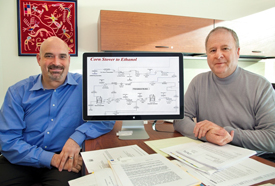Making Do with More: Joint BioEnergy Institute Researchers Engineer Plant Cell Walls to Boost Sugar Yields for Biofuels
When blessed with a resource in overwhelming abundance it’s generally a good idea to make valuable use of that resource. Lignocellulosic biomass is the most abundant organic material on Earth. For thousands of years it has been used as animal feed, and for the past two centuries has been a staple of the paper industry. This abundant resource, however, could also supply the sugars needed to produce advanced biofuels that can supplement or replace fossil fuels, providing several key technical challenges are met. One of these challenges is finding ways to more cost-effectively extract those sugars. Major steps towards achieving this breakthrough are being taken by researchers at the U.S. Department of Energy (DOE)’s Joint BioEnergy Institute (JBEI).
“Through the tools of synthetic biology, we have engineered healthy plants whose lignocellulosic biomass can more easily be broken down into simple sugars for biofuels,” says Dominique Loque, who directs the cell wall engineering program for JBEI’s Feedstocks Division. “Working with the model plant, Arabidopsis, as a demonstration tool, we have genetically manipulated secondary cell walls to reduce the production of lignin while increasing the yield of fuel sugars.” (more…)

